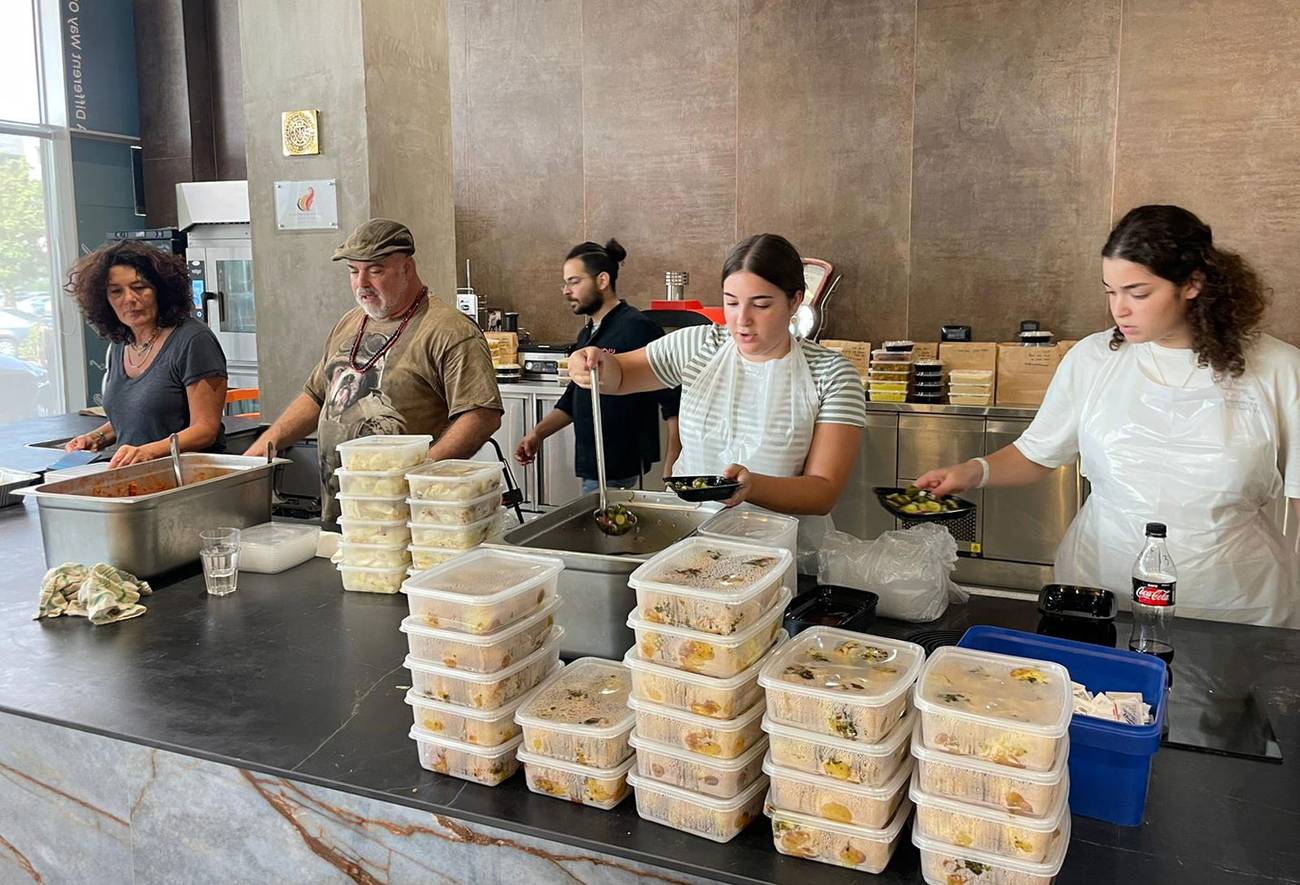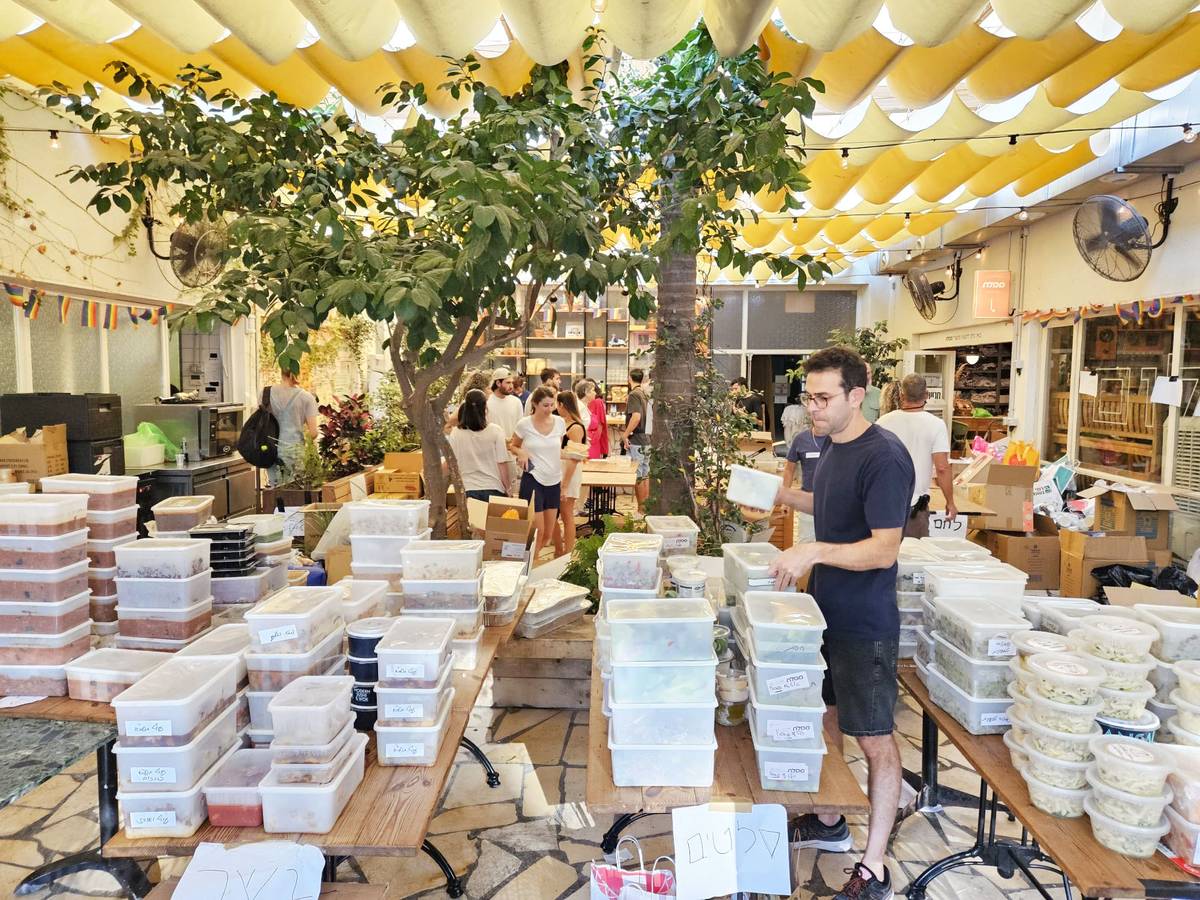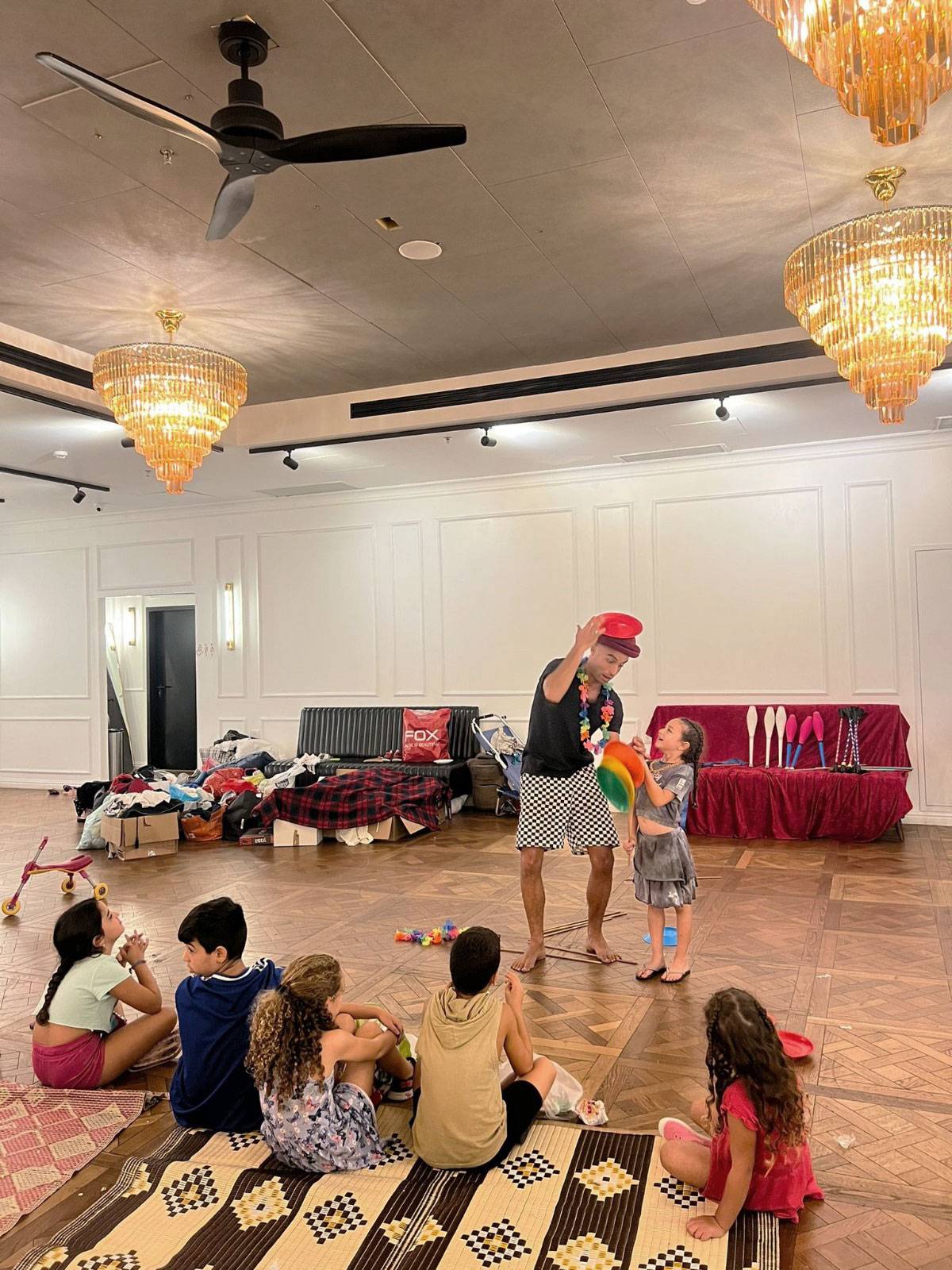More Than a Hot Meal
Israeli restaurants and hotels offer free food and shelter for displaced civilians—as well as grieving families and soldiers preparing for battle

David Kichka

David Kichka

David Kichka
“Let’s talk in an hour. I’m in the middle of something,” David Kichka, entrepreneur and chairman of the Israeli Association for Culinary Culture, texted me on Thursday. It was 6:30 a.m. in Israel, but he had been awake for a few hours. Since the war in Israel broke out the previous Saturday, Kichka—in collaboration with Attilio, a cooking school in the central city of Or Yehuda—had been hard at work: Nearly overnight, the school’s grounds turned into a bustling operations center in which chefs and restaurateurs prepare, package, and distribute food for people affected by the horrific events of the past few days. When we did get to talk later that morning, Kichka was incredibly energized. “I’ve been living on very little sleep and lots of adrenaline,” he said. “The desire to help is so strong.”
Like him, many in the Israeli hospitality industry have been operating for the past week in an impossible cloud of uncertainty, sadness, and a burning motivation to contribute—to soldiers, grieving families, overworked doctors, and displaced civilians alike. In a matter of days, stand-alone initiatives, such as food trucks offering free refreshments for soldiers, and more ambitious, organized efforts have sprung up all over the country. They aim to feed, comfort, and shelter people who’ve been experiencing the worst days of their lives.
“There’s an incredible civil mobilization,” said Yotam Doktor, who, together with his brother Asaf, owns the popular shipudim (skewers) restaurant Ha-Achim (meaning “the brothers” in Hebrew) in central Tel Aviv. “It’s the understanding that there’s no one to trust but ourselves and the army.”
Since last Sunday morning, Doktor’s restaurant has been packed with suppliers donating ingredients, well-known chefs preparing them, volunteers on a packaging mission, and drivers ready to bring the food to hospitals and army bases. Nearly 25,000 portions leave the kitchen daily, a staggering number for a project that’s been around for just a week. “We texted a few people on Saturday, we posted a post on Instagram, and were fully operational within hours,” Doktor said.

Courtesy Ha-Achim
According to Doktor, some of the biggest names in the Israeli culinary world are cooking at the restaurant daily: Raz Rahav from the upscale OCD, Uri Scheft of the Lehamim baked goods empire, and Jonathan Borowitz of the meat sensation M25 are just a few examples. To streamline the nonstop requests, a logistical center has been established at the restaurant.
Similar models—donated ingredients, dozens of professional chefs, and many volunteers in supporting roles—have been spotted both at Attilio and at Assif, a culinary center and restaurant in Tel Aviv, where entrepreneur and food and beverage consultant Gil Akerman established a full-blown production center with his friend, chef Gome Galily. The two own a commercial kitchen elsewhere, but Akerman turned to the bright and spacious Assif because he wanted volunteers to experience “the joy of making, and to infuse the food with good energy.”
Since the war started, Akerman says, the team starts every day with a meeting, listing all incoming food requests, which the operation gets directly and through social media channels. Nuances are discussed; some requests come from families, who need warm meals, and some from groups of soldiers who are in need of faster, grab-and-go options. The menu is planned, executed, delivered: roast beef sandwiches, pickles, salads, and more. “We’ve all been to the army, and we know what people need,” Akerman said with a hint of sadness.
Families are crushed, and we’re answering a need, while trying to bring a smile on their faces. It’s the least we can do.
One recent receiver of such food delivery is a reserve soldier named Oren, who asked to keep his last name anonymous due to safety concerns. Currently stationed near Bethlehem, Oren highlights the delicious difference between a basic need of food in general, and a pampering plate of oxtail stew and fluffy rice. “We were drafted urgently, there was no food,” he said. “On the first day, we’d been eating mostly canned tuna.” Then Oren texted Akerman, who’s a friend, and things looked up. When the food for Oren’s group arrived at the army base, he said, “Everything was top-notch and nicely packed, and it warmed our hearts to feel cared for. We really needed a good, warm meal to regain strength and motivation. It feels good to feel supported.”
At Kichka’s operation in Or Yehuda, the focus has been mainly on those forgotten and neglected in the chaos: the elderly, who have been left without social services, families of wounded survivors and missing people, and families sitting shiva or awaiting news about missing loved ones. A staff of volunteer chefs has been attending the kitchen daily, alongside restaurateurs who might approach Kichka with 400 falafel-stuffed pita sandwiches and huge quantities of cakes, asking who might need them.
A few days ago, headlines were made when a truck full of Ha-Achim’s warm meals was refused entrance at the gates of Nevatim army base, due to its lack of a kashrut certificate. The incident prompted the brothers to quickly issue a certificate and to start working with a kashrut supervisor from the Israeli Rabbinate. “We’re all working side by side, people of all ages, with or without a kippah,” said Doktor. “It’s a shame it took such a huge disaster to unite us.”
Kichka highlights that the Attilio cooking school is kosher. When it comes to feeding “all of Israel,” he said, kashrut must be considered: “Families are crushed, and we’re answering a need, while trying to bring a smile on their faces. It’s the least we can do.”
An unprecedented number of hotels, zimmers, and B&Bs in Israel have mobilized to cover another urgent need: shelter. Since the war’s inception, the media has been flooded with lists of guesthouses and hotels small and large offering to accommodate families for free. At the Brown Bobo hotel in Tel Aviv—the convention center that, until recently, hosted parties and conferences—is currently a “part recreation room, part emergency center,” according to the hotel chain’s spokesperson Shahaf Segal. As many had lost their homes and been forced to evacuate, Brown Bobo has been offering a free stay to groups from danger zones. The hotel is currently hosting at least 70 people, the majority of them from the southern kibbutz of Karmiya.

Courtesy Brown Bobo
In close proximity to the less fortunate Netiv ha-Asara and Be’eri, the kibbutzim that were ground zero for the Hamas massacre, the majority of Karmiya’s residents, farther from the Gaza border, were warned by the neighbors and fled early. An organizer on the residents’ behalf had passed a spreadsheet with escape plans—and the hotel in Tel Aviv was one of the places they were told to go. “On Sunday I was the woman speeding down the road in a pink pajama, with three children,” said former Karmiya resident Adva Graziani, who’s currently staying at Brown Bobo.
There, she was welcomed not only with a room, but also a tight schedule packed with activities for adults and children, and services such as shiatsu massages and manicures, all by volunteers. “On one hand, we’re angry and disappointed in the government,” Graziani said, “but on the other hand, here, we’ve been wrapped in understanding and love.”
This duality is, partially, at the core of the initiatives: a shared sentiment of abandonment and an urge to take matters into one’s own hands, to compensate and rebuild. “There’s a distrust in the government and the leadership, an understanding that it’s just us, the civilians, and the army, and we’re in it together,” said Doktor. But on a very basic level, action also heals. When the war began, it was Akerman’s concern for Galily’s mental health, as a shell-shocked, ex-combat soldier, that prompted the joint project. “We’re broken, and it’s good to distract yourself,” said Doktor. “If I hear that someone’s in deep distress, I immediately tell them to come to the restaurant—we’ll find something for you to do!”
Donations can be made online to Ha-Achim, and via PayPal to David Kichka or Gil Akerman.
Flora Tsapovsky is a San Francisco-based food and culture writer.